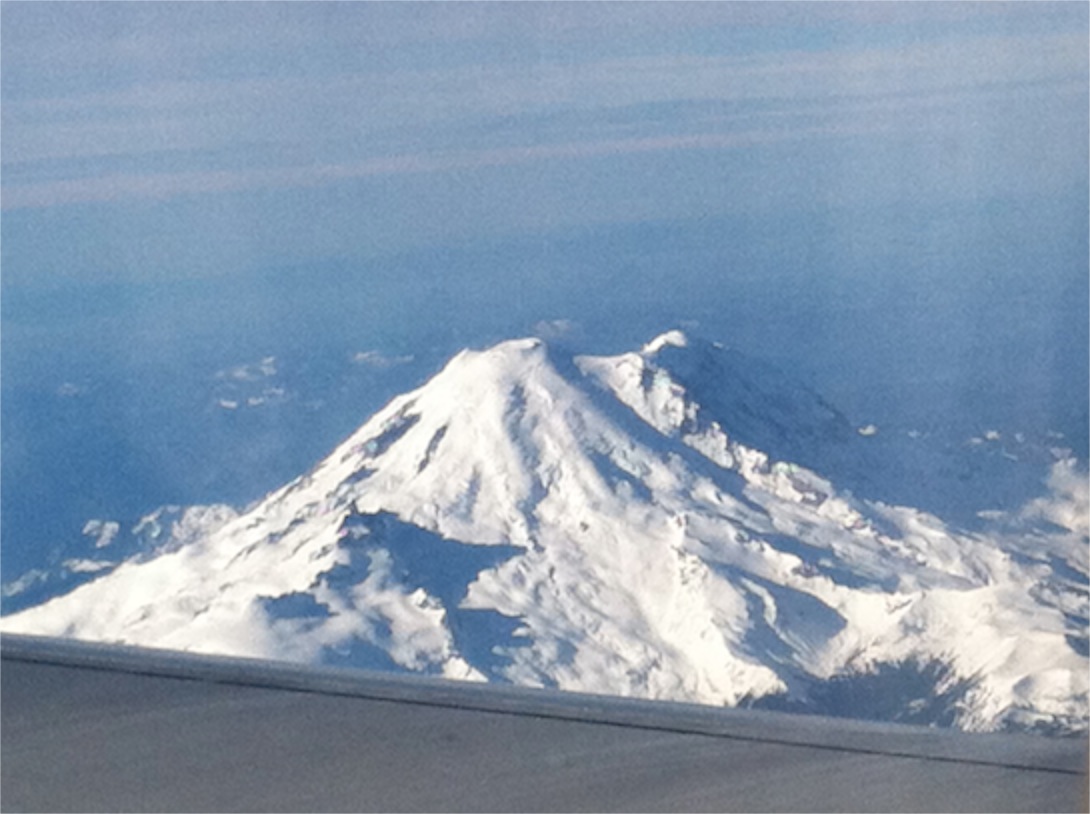Amazing World
08/02/12 03:40
Thousands of people do it every day. I am sure that people learn to take it for granted. But it still amazes me. Yesterday we got up in Rapid City. It was about 19 degrees with a skiff of snow on the ground. We headed out to the airport where our airplane boarded a few minutes early so there would be time to de-ice the plane for an on-time departure. We ended up leaving Rapid City about 8 minutes late, and arrived in Denver about 5 minutes behind the scheduled time. The weather in Denver was blustery with wind and blowing snow. We had no trouble with our connection and soon were on our way to Seattle. We gathered our luggage at the airport and walked to the shuttle stop where our van was waiting for us. An hour later we were at our motel in Olympia. Our son came by on his lunch hour and took us out to lunch.
We had breakfast in Rapid City, South Dakota, and lunch in Olympia, Washington on the same day. It never ceases to amaze me.
I grew up around airplanes. I soloed as soon as I was old enough. I got my pilot’s license when I was 17. That summer, as I was waiting for my birthday so I could take my flying test, I would fly 500 miles before work some days. I have known a life of many wonderful trips and a few fairly long ones. I have flown from Calgary, BC to Amsterdam, Netherlands; from Los Angeles to Melbourne, Australia; from Vancouver, BC to London. I’ve made some of the big trips. I grew up expecting to travel. Through my father’s connections, I got a ride on the first 747 that Northwest Airlines bought. I’ve ridden in the jump seat as an airline pilot takes a check ride being examined for proficiency in instrument procedures. I’ve had my 15 minutes in the left seat of the B-1 Lancer Bomber full motion flight simulator. I’ve sort of grown up to expect that there are some incredible journeys in life.
What amazes me is the amount of travel that is routine in our world today. It is not just incredible that we can cover such a distance in so short an amount of time, but also that such travel is routine. This isn’t the first time we have made the trip from home to the West Coast in a half of a day. We expect to be able to make such trips on a regular basis. Such long-distance travel was virtually unknown to previous generations. And there are still many people in the world for whom the kind of trips we take for granted are simply impossible.

As we traveled across Idaho yesterday, the skies began to clear. From the airplane, we could see the giants of he northern cascades appear: Mt. Hood, Mt. Adams, Mt. St. Helens and Mt. Rainier. Our flight path took us just to the north of Mt. Rainier where we could get a good look at the snow-covered peak. I was reminded how these mountains were sacred places to the people who dwelt in this area long before there were any methods of high-speed travel. When there were just a few people living in the area, they could see the mountain that we know as Mt. Rainier from the Puget Sound. The people lived close to the water, eating from the rich stores of seafood that were abundant in the relatively calm waters of the sound. On clear days, however, they could see the Olympic Mountains to the West and the Cascades to the east. Mt. Rainier was so high and prominent that it was impossible to ignore. Some of the people were drawn to the mountain and undertook the journey for a closer look. We don’t know whether or not early people climbed to the peak. It is unlikely, as the peak is covered in snow and ice all year around and such a climb is treacherous, even with modern equipment. But they would have had to walk for several days even to make the walk up the base of the mountain. And even if they only climbed part way up, they would have had an incredible view.
Yesterday, as our plane descended, we could see the sound stretching to the south to Olympia and to the north towards Vancouver Island. The day was beautiful and clear and the surface of the water was dotted with all kinds of boats. Several huge ocean-going freighters were being unloaded in the ports and others were making their way across the water. On the land the highways were filled with cars and trucks heading in every direction. We are a mobile people and we have developed a lifestyle that is dependent upon moving great amounts of goods over great distances. It is not just that we rode the airplanes yesterday. So did the mail, fresh food and produce, and a variety of other items. We are used to going to the grocery store and being able to purchase seafood that was fresh caught just hours before the store opened. We have grown accustomed to having fresh fruits and vegetables every day and in every season. The systems of transportation are so reliable that we rarely think of them. Usually it takes a temporary disruption in the transportation to get us to notice at all.
The real treasure for us, of course, is to be able to share time with our family. For generations families have parted as one or more members choose to live in different locations. In the past, having a child move thousands of miles away meant that face-to-face contact was rare. Even reliable mail service is a relatively new phenomenon in human history. These days, we are able to videoconference regularly and see one another whenever we want.

In the early afternoon we went to the day care center where our grandson stays when his parents are working. He woke from his nap and recognized us. It is a simple thing, really. And nonetheless it is amazing. We live a long way from his home. Tomorrow he will be one year old. And even though we live in different places we are able to maintain a close relationship. We live in an amazing world. And we are indeed fortunate.
We had breakfast in Rapid City, South Dakota, and lunch in Olympia, Washington on the same day. It never ceases to amaze me.
I grew up around airplanes. I soloed as soon as I was old enough. I got my pilot’s license when I was 17. That summer, as I was waiting for my birthday so I could take my flying test, I would fly 500 miles before work some days. I have known a life of many wonderful trips and a few fairly long ones. I have flown from Calgary, BC to Amsterdam, Netherlands; from Los Angeles to Melbourne, Australia; from Vancouver, BC to London. I’ve made some of the big trips. I grew up expecting to travel. Through my father’s connections, I got a ride on the first 747 that Northwest Airlines bought. I’ve ridden in the jump seat as an airline pilot takes a check ride being examined for proficiency in instrument procedures. I’ve had my 15 minutes in the left seat of the B-1 Lancer Bomber full motion flight simulator. I’ve sort of grown up to expect that there are some incredible journeys in life.
What amazes me is the amount of travel that is routine in our world today. It is not just incredible that we can cover such a distance in so short an amount of time, but also that such travel is routine. This isn’t the first time we have made the trip from home to the West Coast in a half of a day. We expect to be able to make such trips on a regular basis. Such long-distance travel was virtually unknown to previous generations. And there are still many people in the world for whom the kind of trips we take for granted are simply impossible.

As we traveled across Idaho yesterday, the skies began to clear. From the airplane, we could see the giants of he northern cascades appear: Mt. Hood, Mt. Adams, Mt. St. Helens and Mt. Rainier. Our flight path took us just to the north of Mt. Rainier where we could get a good look at the snow-covered peak. I was reminded how these mountains were sacred places to the people who dwelt in this area long before there were any methods of high-speed travel. When there were just a few people living in the area, they could see the mountain that we know as Mt. Rainier from the Puget Sound. The people lived close to the water, eating from the rich stores of seafood that were abundant in the relatively calm waters of the sound. On clear days, however, they could see the Olympic Mountains to the West and the Cascades to the east. Mt. Rainier was so high and prominent that it was impossible to ignore. Some of the people were drawn to the mountain and undertook the journey for a closer look. We don’t know whether or not early people climbed to the peak. It is unlikely, as the peak is covered in snow and ice all year around and such a climb is treacherous, even with modern equipment. But they would have had to walk for several days even to make the walk up the base of the mountain. And even if they only climbed part way up, they would have had an incredible view.
Yesterday, as our plane descended, we could see the sound stretching to the south to Olympia and to the north towards Vancouver Island. The day was beautiful and clear and the surface of the water was dotted with all kinds of boats. Several huge ocean-going freighters were being unloaded in the ports and others were making their way across the water. On the land the highways were filled with cars and trucks heading in every direction. We are a mobile people and we have developed a lifestyle that is dependent upon moving great amounts of goods over great distances. It is not just that we rode the airplanes yesterday. So did the mail, fresh food and produce, and a variety of other items. We are used to going to the grocery store and being able to purchase seafood that was fresh caught just hours before the store opened. We have grown accustomed to having fresh fruits and vegetables every day and in every season. The systems of transportation are so reliable that we rarely think of them. Usually it takes a temporary disruption in the transportation to get us to notice at all.
The real treasure for us, of course, is to be able to share time with our family. For generations families have parted as one or more members choose to live in different locations. In the past, having a child move thousands of miles away meant that face-to-face contact was rare. Even reliable mail service is a relatively new phenomenon in human history. These days, we are able to videoconference regularly and see one another whenever we want.

In the early afternoon we went to the day care center where our grandson stays when his parents are working. He woke from his nap and recognized us. It is a simple thing, really. And nonetheless it is amazing. We live a long way from his home. Tomorrow he will be one year old. And even though we live in different places we are able to maintain a close relationship. We live in an amazing world. And we are indeed fortunate.